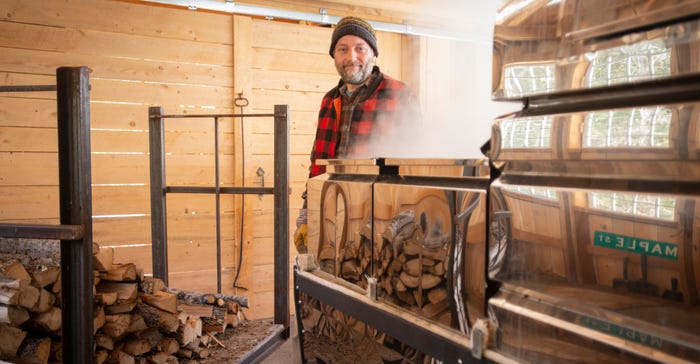January 11, 2022

Rick and Beverly Wright of Bethel, Vt., sold their 50-cow herd of Jerseys and Ayrshires to their son and are now ready to rely on their large woodlot for more income.
Rick loves to sugar. He even loves to cut the 10 cord of wood it takes to fire his evaporator each spring. But like a lot of sugar-makers, “I like making maple better than selling it,” he says.
He’s the kind of sugar-maker Cory Krieg had in mind when he started maplefarmers.com, a collective of Vermont producers who make maple syrup on wood-fired evaporators and bottle it in glass.
Krieg developed a website where customers can order syrup from any of six participating producers. He then provides the producer with a mailing label and shipping container for the order, and returns $12 per quart to the producer, about double what they can get from bulk buyers. Maple Farmers is starting to offer half-pints too, which have proven very popular.
Of the six sugar-makers signed up with Maple Farmers in its first year — 2021 — two are dairy farmers, one raises beef, another grows vegetables and one is a stone mason. They vary in size, from Krieg’s 300 taps to 1,100 taps.
Despite the poor sugaring season in 2021, the website started off well, Krieg says. By Christmas, producers were just about out of syrup. Taking on the chore of marketing, he says, really helps small sugar-makers.
“Maple Farmer producers don’t have to sell, market or find the market. So there’s no real risk for them,” he says.
Tasting the past
Krieg is banking on customers’ nostalgia for the idyllic small family farm and for what he calls the taste and quality of syrup made on wood-fired evaporators with little or no use of modern techniques, such as reverse osmosis, and bottled in glass, not plastic.
“It’s the craft and the flavor” that makes a superior syrup, he says.
Krieg, an electrical engineer, came up with the idea after building a new sugarhouse on his Maple Flower Farm in East Bethel, Vt., three years ago. He has 300 taps on a neighbor’s property.
“I didn’t like the idea of having to go big to make it,” he says. “And it was the start of the pandemic and the internet boom for maple. So, how to get people buying maple online?”
Other small producers were selling bulk syrup to large bottlers but didn’t get paid much, Krieg says, and some bulk purchasers announced that they would no longer buy from small operations anymore. There’s just as much paperwork for them dealing with small producers as with large, especially with stricter Food and Drug Administration standards coming down the line.
Retail markets have also been shrinking for small producers.
“Everybody has a story about losing markets, especially in the last few years, due to consolidation of buyers or the pandemic,” Krieg says. The idea of a group of small farms competing with the corporations — the “impersonal factory farms,” as he describes them — appeals to him and many of today’s customers.
New way to sell
Rick Wright’s Gilead Brook Farm lies at the dead end of a 5-mile dirt road in Bethel, Vt. When his father lived at the bottom of the road, on busy Route 12, marketing was easy — his father just put out a sign and sold most of the syrup.
Now, with Rick’s dad no longer living there, it’s been much tougher to sell syrup, especially as COVID-19 has made people wary of face-to-face sales. And because the farm only got access to high-speed internet last June, online sales haven’t been an option.
Wright, who sold about half of last year’s crop from his 800 taps through maplefarmers.com, says the collective fits nicely in this central Vermont area of small farms. “We always liked a small operation; you can do a good job and do it the way it should be done,” he says. “I think Maple Farmers is a great idea. It’s made a good outlet, and people responded well to the glass.”
Although his primary aim is to make sure the collective’s first six producers sell their syrup, Krieg says other producers are calling him, and he’ll bring on more.
“Bottom line, I expect to have farms all across Vermont in the relatively short term,” he says. But, unlike most maple syrup brands, the name “Vermont” is not on the label. Someday, at least Krieg hopes, Maple Farmers will represent small producers from all maple-producing regions.
“I really want to see small family farms survive,” he says.
What’s his advice for others who want to develop a similar model? Focus on marketing, packaging and shipping, he says. And be willing to accept different expertise and skills than farming.
“In the end, it comes down to your passion,” Krieg says. “If you're not driven to have the business be your primary focus, then you risk spending a ridiculous amount of effort to lose a lot of money.”
Harlow writes from Vermont.
About the Author(s)
You May Also Like




